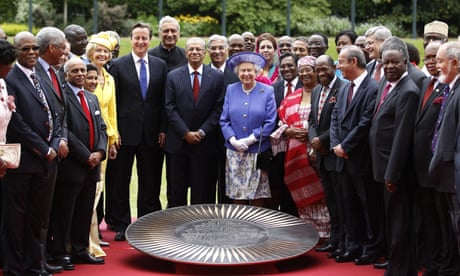By Julian Borger in Washington DC, The Guardian
- Boris Johnson scandals, energy crisis – not to mention Brexit – have undermined Britain’s influence
The prevailing view from America of post-Brexit, post-Elizabethan Britain is principally one of a country of declining influence which is in danger of sinking on the world stage as a result of mostly self-inflicted crises.
The US news coverage of the day of the Queen’s death was overwhelmingly reverent, but by Friday there was already a backlash, pointing to the inseparable bond between the royal family and the country’s imperial past.
Maya Jasanoff, a professor of history at Harvard, argued that the Queen had been the stolid and traditionalist face for a particularly bloody period at the end of the empire, as British forces were fighting independence struggles in Kenya, Malaya and Cyprus.
“These were violent and showed the British extremely unwilling to leave the colonies, which is grotesquely different from the transfer of power that’s implied,” Jasanoff said.
She sees the ghost of empire hanging over Britain’s current cluster of national crises.
“It’s a country that, with Brexit, dealt a self-inflicted blow, in part on the basis of certain ideas about what Britain represents, what Britain’s role in the world is, and those ideas of Britain’s role in the world emanate from the imperial past,” Jasanoff argued.
In the Washington Post, columnist Ishaan Tharoor also weighed Elizabeth’s culpability for the abuses across the remnants of empire after the second world war during her reign, and decided she was “perhaps not privy to all the sordid details of the operations carried out to preserve her empire”. But he argued she had cast herself as “the happy steward of the Commonwealth” of former colonies, pointing out “its history was hardly benign”.

Having lost an empire and then given up its place in the European Union, Tharoor said, the UK was facing “a moment of contraction and uncertainty with “its global status diminished” at the end of the Elizabethan era.
Pessimism about Britain’s prospects is spread across the US political spectrum. Frank Luntz, a Republican pollster who has also worked as an analyst of British politics, said: “The UK is at a truly critical juncture. Politically, economically, even ethically, the institutions and the people who lead them are losing the faith and trust of the people they lead.
“The one steady, predictable force was the Queen, but now she’s gone. Candidly, I fear for Britain’s future,” Luntz said. “I’ve watched what happens in America when there’s no one to unify the country. No one stepped forward, and we can all see the consequences. The Queen was a great unifier. Somebody desperately needs to take her place.” Advertisement
Before the Queen’s death – and in some of the coverage afterwards – US media stories about Britain have focused on a succession of crises: the recurring political crises of the Boris Johnson government, the energy crisis, the cost of living crisis, and the dramatic fall in the value of the pound, which some predict is on course for parity with the dollar by next year.
“I really think that to get out of this deep downward trajectory, there has to be significant innovation,” Elizabeth Carter, assistant professor of political science at the University of New Hampshire, said, suggesting the government stabilisation of energy prices as an example.
“Continuing with the old tools and playing by the old rules of the game would lead to a long-term decline,” Carter added, suggesting “that decline could be steeper than anything the UK has experienced since world war two.”
Staying on the same downward course would in turn make it more likely that Scotland would vote for independence, which would be a devastating blow, and accelerate the UK’s downward spiral in the global arena, she argued.
Daniel Serwer, a former US diplomat, said he sees a Scottish declaration of independence as inevitable.
“The UK has suffered a sudden drop off in its power and influence,” Serwer, now a senior fellow at the School for Advanced International Studies at Johns Hopkins University, said. He described the lure of a US-UK trade deal that would somehow compensate for the losses of leaving the EU market as “complete and utter bullshit” at a time when the US itself is getting more protectionist.
“The UK doesn’t have the leverage that the European Union has in a trade negotiation,” Serwer said. “There’s enormous attachment in the United States to the United Kingdom, but looked at with the cold eye of realism, it’s not the partner it once might have been.”





